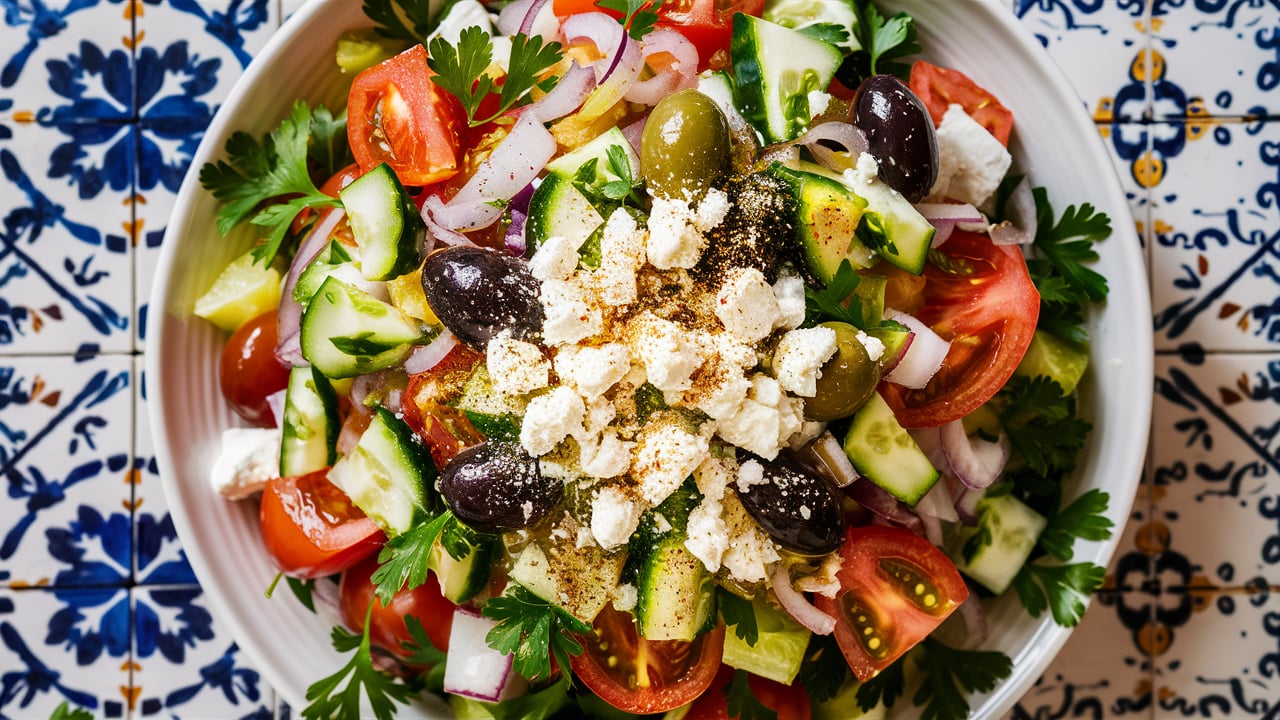Introduction
Turkish Salad, also known as Çoban Salatası or Shepherd’s Salad, is a colorful and refreshing dish that is an essential part of Turkish cuisine. The salad brings together fresh, simple ingredients like tomatoes, cucumbers, green peppers, and onions with olive oil and lemon juice. Known for its light and fresh qualities, Turkish salad pairs well with many meals, from grilled meats to hearty stews. But what exactly goes into making this flavorful dish? In this guide, we’ll explore the key ingredients, look at different regional variations, and talk about the health benefits that make this salad a great addition to your meals.
The Basics: Key Ingredients of Turkish Salad
- Tomatoes (Domates): The base of any Turkish salad is tomatoes. They add juicy sweetness and bright color to the dish, making them a must-have ingredient. In Turkey, people prefer ripe summer tomatoes that are full of flavor. Typically, the tomatoes are cut into small pieces to make sure every bite is packed with taste.
- Cucumbers (Salatalık): Cucumbers add a cool, crisp contrast to the sweetness of the tomatoes. Persian or Turkish cucumbers are often chosen because they have fewer seeds and thinner skins compared to other types. Like the tomatoes, cucumbers are diced into small cubes, which improves the overall texture and flavor of the salad.
- Green Bell Peppers (Yeşil Biber): Green bell peppers bring a slight bitterness and crunch to the salad. Most recipes call for finely chopped green bell peppers, which mix well with the other vegetables. In some versions of the salad, sweet red bell peppers or even spicy green chili peppers are used, depending on regional or personal preferences.
- Onions (Soğan): Red onions, in particular, add a sharp and strong flavor to the salad. Onions are usually thinly sliced or finely chopped and combined with the other vegetables. To reduce their strong taste, some cooks soak the onions in water for a few minutes before adding them to the salad.
- Parsley (Maydanoz): Parsley is an important herb in Turkish salad, adding a fresh and slightly bitter taste that balances the sweetness of tomatoes and the crunch of cucumbers. Flat-leaf parsley, known for its stronger flavor, is usually finely chopped and generously sprinkled over the salad.
- Olive Oil (Zeytinyağı): Olive oil ties all the flavors together in Turkish salad. Extra virgin olive oil, which has a fruity and strong flavor, is preferred to boost the taste of the vegetables. A good drizzle of olive oil adds richness and depth, making the salad more satisfying.
- Lemon Juice (Limon Suyu): Freshly squeezed lemon juice adds a bright tanginess that balances the richness of the olive oil. Lemon juice also brings out the natural flavors of the vegetables, making the salad refreshing and zesty.
Key Ingredients of Turkish Salad
Tomatoes (Domates)
The foundation of a traditional Turkish salad lies in its tomatoes. Their juicy sweetness and vibrant color bring life to the dish. In Turkey, ripe summer tomatoes are preferred for their robust flavor, offering the best taste experience. Usually, they are diced into small pieces, making them easy to incorporate into the salad.
Cucumbers (Salatalık)
Cucumbers offer a crisp, cool contrast to the sweetness of the tomatoes. Persian or Turkish cucumbers, chosen for their fewer seeds and thinner skins, provide the perfect texture. These cucumbers are diced into small cubes, ensuring a balanced bite with every forkful.
Green Bell Peppers (Yeşil Biber)
Adding a slight bitterness and crunchy texture, green bell peppers are essential to Turkish salad. In various regional adaptations, you might find sweet red bell peppers or spicy green chili peppers used instead, depending on the preferences of the cook.
Onions (Soğan)
Red onions contribute sharpness and depth of flavor. Some chefs prefer to soak the onions in water to mellow their strong taste before incorporating them into the salad. This method helps balance the overall flavor profile of the dish.
Parsley (Maydanoz)
Parsley is an essential herb in Turkish salad, offering a fresh, slightly bitter note that complements the other ingredients. Typically, flat-leaf parsley is finely chopped and generously sprinkled over the salad, adding both flavor and visual appeal.
Olive Oil (Zeytinyağı)
Olive oil is the ingredient that ties all the flavors together. Known for its fruity and robust flavor, extra virgin olive oil is the preferred choice to enhance the taste of the vegetables.
Lemon Juice (Limon Suyu)
Freshly squeezed lemon juice provides the necessary tanginess to the salad. By balancing the richness of the olive oil, it enhances the natural flavors of the vegetables, making the dish zesty and refreshing.
Salt and Pepper (Tuz ve Karabiber)
Seasoning with salt and pepper brings out the full flavors of the salad. Additionally, in some variations, a pinch of red pepper flakes (pul biber) is added for a hint of heat.
Related: Healthy Gluten-Free Bread Recipe
How to Make Traditional Turkish Salad
Ingredients:
- 4 ripe tomatoes, diced
- 2 cucumbers, diced
- 1 green bell pepper, finely chopped
- 1 small red onion, thinly sliced
- 1/2 cup fresh parsley, chopped
- 1/4 cup extra virgin olive oil
- Juice of 1 lemon
- Salt and pepper to taste
- Optional: Feta cheese, sumac, pomegranate molasses, minced garlic
Instructions:
- Prepare the Vegetables: Dice the tomatoes and cucumbers. Finely chop the bell pepper and thinly slice the red onion. Place all the vegetables in a large mixing bowl.
- Chop the Parsley: Finely chop the parsley and add it to the bowl with the vegetables.
- Make the Dressing: Whisk together olive oil, lemon juice, salt, and pepper. Optionally, add sumac or garlic for extra flavor.
- Toss the Salad: Pour the dressing over the vegetables and toss to coat. Adjust seasoning if necessary.
- Serve: Transfer the salad to a serving bowl. Add toppings like feta cheese or pomegranate molasses before serving.
Variations of Turkish Salad
1. Shepherd’s Salad (Çoban Salatası)
The most classic version of Turkish salad, Shepherd’s Salad features the basic ingredients—tomatoes, cucumbers, green peppers, onions, and parsley—all dressed with olive oil and lemon juice. This salad is a staple at Turkish meals, often accompanying grilled meats and fish.
2. Gavurdağı Salad
Originating from the Gaziantep region, this version includes walnuts, pomegranate molasses, and sometimes sumac. The walnuts add richness, while the pomegranate molasses delivers a sweet-tart contrast.
3. Ezme Salad
A spicy, finely chopped alternative, Ezme salad is made with tomatoes, peppers, onions, garlic, and parsley. The fiery kick comes from red pepper flakes. This salad is usually served as a meze alongside kebabs.
Health Benefits of Turkish Salad
Turkish salad is not just delicious; it also offers numerous health benefits:
- Rich in Vitamins and Minerals
Tomatoes provide vitamin C and lycopene, which may lower the risk of heart disease. Cucumbers offer hydration and vitamins K and B, while parsley adds vitamins A, C, and K. - High in Antioxidants
The combination of tomatoes, parsley, and olive oil delivers powerful antioxidants, including lycopene and polyphenols, which help fight inflammation and reduce the risk of chronic diseases. - Supports Digestive Health
The high fiber content in the salad promotes healthy digestion by regulating bowel movements and feeding beneficial gut bacteria.
Part 2: Exploring Turkish Salad Variations
Shepherd’s Salad (Çoban Salatası)
Shepherd’s Salad is a classic, offering the traditional ingredients of Turkish salad in their simplest form. This version is often served with grilled meats or fish. The balance of fresh vegetables, olive oil, and lemon juice makes it the perfect accompaniment to richer dishes.
Related: Broccoli Raisin Salad
Gavurdağı Salad
This salad adds depth with chopped walnuts and a drizzle of pomegranate molasses, making it a richer and more complex option. Its origins in southeastern Turkey bring a unique twist to the basic recipe, showcasing the regional diversity within Turkish cuisine.
Related: Crescent Roll Breakfast Recipes
Ezme Salad
Spicy and bold, Ezme Salad is perfect for those who love a bit of heat in their dishes. The finely chopped ingredients and fiery red pepper flakes make this a favorite meze, often served with kebabs or grilled meats.
Frequently Asked Questions (FAQs)
1. Can Turkish salad be made ahead of time?
Yes, Turkish salad can be made ahead of time, but it’s best to add the dressing just before serving to keep the vegetables crisp and fresh. You can prepare the vegetables and store them in the refrigerator, then toss them with the dressing right before serving.
2. Is Turkish salad vegan?
Traditional Turkish salad is vegan since it uses only fresh vegetables, olive oil, and lemon juice. However, if you add ingredients like feta cheese, the salad would no longer be vegan. To keep it vegan, simply skip the cheese and enjoy the salad with the classic ingredients.
3. Can I add protein to Turkish salad?
Yes, you can easily add protein to Turkish salad to make it more substantial. Grilled chicken, shrimp, or chickpeas are excellent options that pair well with the fresh flavors of the salad.
4. How long does Turkish salad last in the fridge?
Turkish salad lasts for about 2-3 days in the refrigerator when stored in an airtight container. However, the vegetables may lose their crunch after the first day, so it’s best to enjoy the salad fresh.
5. What can I serve with Turkish salad?
Turkish salad pairs well with a variety of dishes, including grilled meats like kebabs, fish, or chicken. It also goes nicely with rice pilaf, flatbreads, or hummus. You can serve it as part of a mezze platter alongside other small dishes like stuffed grape leaves, baba ganoush, and tzatziki.
Conclusion: What is Turkish Salad Made Of?
In conclusion, Turkish salad combines fresh vegetables like tomatoes, cucumbers, green peppers, onions, and parsley, all dressed with olive oil and lemon juice. This salad is a staple in Turkish cuisine and is often served as a side dish with grilled meats, fish, or stews. While the basic ingredients remain consistent, there are many regional variations of Turkish salad, each adding its unique twist with ingredients like walnuts, pomegranate molasses, or sumac.
Not only is Turkish salad delicious, but it’s also packed with health benefits. The fresh vegetables provide essential vitamins, minerals, and antioxidants that support overall health, while the olive oil adds healthy fats that promote heart health. Whether you’re looking for a light side dish or a refreshing appetizer, Turkish salad is a versatile option that can be enjoyed with a wide variety of meals.

